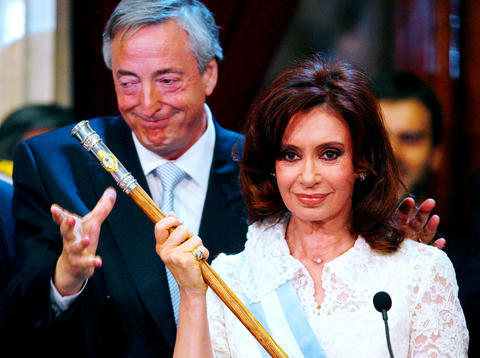Nestor Kirchner, Argentina's most popular president in decades, draped the light-blue-and-white sash over the shoulder of his wife, Cristina Fernandez de Kirchner, on Monday, officially passing power to the first woman to be elected Argentina's leader in its 191-year history.
The handover was sealed with an emphatic, crowd-pleasing hug that seemed to make Cristina Kirchner blush. She repeatedly stroked her husband's back during the embrace. No modern-day couple in a democracy has carried out a comparable transfer of power, and certainly not in Latin America.
In their four and a half years in the presidential palace, the couple, affectionately known as "the penguins" -- a reference to Nestor Kirchner's Patagonian home state of Santa Cruz -- have evolved into Latin America's dynamic duo, power brokers who hold sway over their country of 40 million people.

PHOTO: AFP
One major reason is Nestor Kirchner's stewardship following the country's worst financial crisis. The improvements in the country were, Cristina Kirchner said, "a result of his convictions," which she added, "are also mine."
Since shortly after Nestor Kirchner announced in July that he would not run for re-election and would back his wife's candidacy instead, the couple have made little secret of their plans to lead together. Cristina Kirchner conducted a carefully orchestrated campaign heavy on international diplomacy but light on opportunities for rigorous press questioning or debates with her rivals. In the end, facing a fractured opposition, she won emphatically, doubling the vote percentage that her husband was able to muster in 2003, when he got 22 percent before a rival dropped out.
"This says a lot about the weakness of Argentina's political party institutions," said Joan Caivano, director of special projects at the Inter-American Dialogue in Washington, who has studied the role of woman in Latin American politics.
"She was anointed by a very popular president, and that doesn't feel like a good thing for a democracy," she said.
But few doubt that the 54-year-old Cristina Kirchner, who served in Congress for a decade, has the political skills to lead. In her typically emphatic inauguration speech on Monday, she set out an agenda that emphasized greater South American integration and a desire to return Argentina to the world stage after four years in which her husband focused on improving the economy after the crisis in 2001.

NO EXCUSES: Marcos said his administration was acting on voters’ demands, but an academic said the move was emotionally motivated after a poor midterm showing Philippine President Ferdinand Marcos Jr yesterday sought the resignation of all his Cabinet secretaries, in a move seen as an attempt to reset the political agenda and assert his authority over the second half of his single six-year term. The order came after the president’s allies failed to win a majority of Senate seats contested in the 12 polls on Monday last week, leaving Marcos facing a divided political and legislative landscape that could thwart his attempts to have an ally succeed him in 2028. “He’s talking to the people, trying to salvage whatever political capital he has left. I think it’s

Polish presidential candidates offered different visions of Poland and its relations with Ukraine in a televised debate ahead of next week’s run-off, which remains on a knife-edge. During a head-to-head debate lasting two hours, centrist Warsaw Mayor Rafal Trzaskowski, from Polish Prime Minister Donald Tusk’s governing pro-European coalition, faced the Eurosceptic historian Karol Nawrocki, backed by the right-wing populist Law and Justice party (PiS). The two candidates, who qualified for the second round after coming in the top two places in the first vote on Sunday last week, clashed over Poland’s relations with Ukraine, EU policy and the track records of their

UNSCHEDULED VISIT: ‘It’s a very bulky new neighbor, but it will soon go away,’ said Johan Helberg of the 135m container ship that run aground near his house A man in Norway awoke early on Thursday to discover a huge container ship had run aground a stone’s throw from his fjord-side house — and he had slept through the commotion. For an as-yet unknown reason, the 135m NCL Salten sailed up onto shore just meters from Johan Helberg’s house in a fjord near Trondheim in central Norway. Helberg only discovered the unexpected visitor when a panicked neighbor who had rung his doorbell repeatedly to no avail gave up and called him on the phone. “The doorbell rang at a time of day when I don’t like to open,” Helberg told television

‘A THREAT’: Guyanese President Irfan Ali called on Venezuela to follow international court rulings over the region, whose border Guyana says was ratified back in 1899 Misael Zapara said he would vote in Venezuela’s first elections yesterday for the territory of Essequibo, despite living more than 100km away from the oil-rich Guyana-administered region. Both countries lay claim to Essequibo, which makes up two-thirds of Guyana’s territory and is home to 125,000 of its 800,000 citizens. Guyana has administered the region for decades. The centuries-old dispute has intensified since ExxonMobil discovered massive offshore oil deposits a decade ago, giving Guyana the largest crude oil reserves per capita in the world. Venezuela would elect a governor, eight National Assembly deputies and regional councilors in a newly created constituency for the 160,000